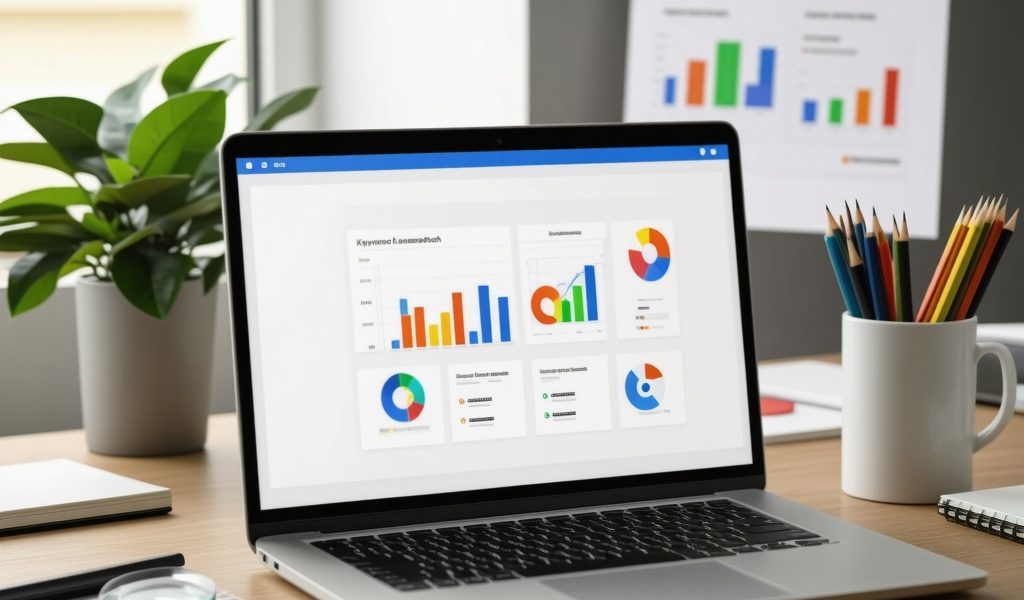Harnessing the Strategic Power of Advanced Keyword Research in GMB Business Descriptions
In the competitive landscape of local search, optimizing your Google My Business (GMB) business description with advanced keyword research transcends basic SEO tactics. It integrates semantic relevance and user intent analysis to elevate your local visibility and attract qualified traffic. This advanced approach not only enhances search engine rankings but also aligns your business narrative with the nuanced language your potential customers use, thus driving higher engagement and conversion.
Semantic SEO: Beyond Keywords to Contextual Relevance
Advanced keyword research in your GMB description moves beyond mere keyword frequency and delves into the realm of Latent Semantic Indexing (LSI). By incorporating semantically related terms and synonyms, your business description attains a natural yet comprehensive coverage of relevant search queries. This method signals to Google that your listing is authoritative and contextually aligned with diverse user intents, a crucial factor in ranking algorithms as highlighted by SEO thought leaders like Moz (Moz SEO Fundamentals).
Integrating User-Centric Keyword Variations to Amplify Local Engagement
In practical application, keyword variations should reflect hyperlocal modifiers, service-specific terms, and customer pain points. For example, including phrases such as “emergency plumbing services in downtown Chicago” or “eco-friendly HVAC installation near me” helps capture niche search segments that generic keywords overlook. This precision facilitates higher click-through rates and customer trust, which are corroborated by local SEO case studies emphasizing conversion-linked keyword strategies.
How Can Businesses Identify High-Impact Keywords for Their GMB Descriptions?
Identifying the most effective keywords involves leveraging advanced tools like Google Keyword Planner, SEMrush, or Ahrefs, combined with analyzing Google My Business Insights. Monitoring competitor descriptions and customer queries on forums or review platforms also reveals valuable language patterns and emerging trends. An iterative testing of different keyword blends within the description can optimize relevance and ranking over time.
Expert Tips for Crafting an Optimized GMB Business Description
- Incorporate primary and secondary keywords naturally without stuffing to maintain readability and trustworthiness.
- Address specific user intents by including action-oriented phrases and unique selling points.
- Update descriptions regularly to reflect seasonal trends, new services, or changing customer needs, enhancing freshness signals to Google.
- Ensure NAP (Name, Address, Phone number) consistency to reinforce local SEO authority.
For a deeper dive into optimizing your Google Business Profile effectively, explore our comprehensive guide on How to Optimize Your Google Business Listing Effectively.
Call to Action: Elevate Your Local SEO Strategy with Expert Insights
To master the intricacies of GMB optimization and ensure your business description leverages cutting-edge keyword research techniques, consider engaging with our expert-level resources and share your professional experiences on local SEO forums. Collaborative learning accelerates mastery and drives sustainable growth.
Leveraging Local Intent Signals for Superior Google Business Description Performance
Understanding and incorporating local intent signals into your GMB business description is a game-changer for local SEO success. These signals include geographic modifiers, localized service attributes, and community-specific terminology that resonate with searchers looking for nearby solutions. By embedding such targeted phrases, your profile not only aligns with search queries containing “near me” or specific neighborhood names but also increases relevance for Google’s local search algorithms.
For instance, a dental clinic might include phrases like “family-friendly dentist in Brooklyn Heights” or “emergency dental care near Williamsburg,” addressing both locality and immediate service needs. This approach enhances click-through rates and user engagement, which are critical ranking factors according to local SEO experts.
Harnessing Behavioral Analytics to Refine Keyword Integration in GMB Descriptions
Advanced GMB optimization transcends keyword insertion by analyzing user behavior metrics such as click patterns, call actions, and direction requests. These insights allow businesses to fine-tune their descriptions by emphasizing keywords that correlate with high engagement and conversions. Integrating these behavioral analytics with keyword research tools offers a powerful feedback loop to continuously optimize your GMB profile for maximum impact.
What Are the Best Practices for Balancing Keyword Density and Natural Language in GMB Descriptions?
Expert consensus suggests that maintaining a natural, conversational tone while strategically placing keywords is paramount. Overstuffing your description with keywords can harm readability and reduce trustworthiness, both for users and search engines. Instead, incorporate primary keywords in the opening sentences and sprinkle secondary and long-tail variations contextually throughout the text. Continuous testing and updating based on performance metrics ensure that your description remains both user-friendly and SEO-effective.
For a comprehensive approach to improving your local search performance, consider conducting a GMB SEO audit to identify optimization opportunities beyond just your business description.
Integrating Multimedia and Structured Data in Your GMB Profile for Enhanced Visibility
While keyword optimization is fundamental, incorporating multimedia elements such as high-quality images and videos, alongside structured data markup, can significantly boost your GMB profile’s effectiveness. Images optimized with descriptive filenames and alt text containing relevant keywords complement the written description, reinforcing topical relevance and improving user engagement.
Structured data, particularly Schema.org markup, assists search engines in better understanding your business attributes, services, and offerings. This technical layer of SEO enhances your profile’s chances of appearing in rich results and local packs, thereby driving more qualified traffic.
The Role of Consistent Citation Management in Sustaining Keyword Authority
Consistent NAP (Name, Address, Phone number) citations across authoritative directories and local listings reinforce your GMB profile’s credibility and keyword authority. Discrepancies in citations can confuse search engines, diluting your local SEO efforts. Employing expert citation services ensures uniformity and strengthens your profile’s trust signals, directly impacting your rankings.
Explore our detailed guide on NAP citation consistency to learn how to maintain this critical SEO component.
According to Search Engine Journal, maintaining citation consistency and optimizing your Google Business Profile with advanced keyword strategies can increase local search visibility and customer acquisition significantly (Search Engine Journal Local SEO Insights).
Enhance Your GMB Keyword Strategy with Continuous Learning and Community Engagement
Stay ahead in the evolving landscape of local SEO by actively participating in SEO communities and forums, sharing insights, and learning from peer case studies. This collaborative approach accelerates your expertise and uncovers innovative keyword strategies that adapt to algorithm updates and market changes.
We invite you to share your experiences optimizing your Google Business Profile in the comments section below or explore more expert resources to deepen your knowledge and enhance your local SEO impact.
Leveraging AI-Powered Predictive Analytics to Revolutionize GMB Description Optimization
In the quest for local SEO supremacy, integrating artificial intelligence (AI) and predictive analytics into your Google My Business (GMB) description strategy represents a cutting-edge advancement. By harnessing machine learning algorithms that analyze vast datasets of consumer behavior, search trends, and competitor performance, businesses can forecast which keywords and phrases will yield superior engagement and conversion rates before committing to content updates.
This approach moves beyond reactive optimization, enabling proactive, data-driven decision-making. For example, AI tools can identify emerging local search patterns such as seasonal demand shifts or new service preferences, allowing marketers to tailor their GMB descriptions dynamically. This strategic foresight ensures your business remains relevant within Google’s evolving local search algorithms and user expectations.
How Can Predictive Analytics Improve Keyword Selection for Hyperlocal GMB Descriptions?
Predictive analytics leverage historical data combined with real-time signals to pinpoint high-value keywords tailored to hyperlocal contexts. By evaluating factors such as search volume fluctuations, competitor keyword penetration, and user engagement metrics, these models predict which long-tail and localized keywords will drive the most qualified traffic. This method reduces guesswork, increases precision, and strengthens your Google Business Profile’s competitive edge.
Leading SEO platforms like BrightEdge now incorporate AI-driven predictive models, enabling marketers to test potential keywords virtually and measure anticipated impacts on local rankings (BrightEdge Predictive SEO Webinar).
Implementing NLP to Enhance Semantic Richness and User Engagement in GMB Profiles
Natural Language Processing (NLP) technology can analyze and generate business descriptions that resonate more authentically with human readers while satisfying search engine semantic criteria. Using NLP, businesses can create descriptions that not only include strategically chosen keywords but also reflect the nuanced ways customers phrase their queries and concerns, such as idiomatic expressions or colloquial terms prevalent in specific locales.
Moreover, NLP tools can assist in identifying sentiment cues and conversational tones that boost user trust and engagement, transforming your GMB description into a compelling narrative rather than a sterile keyword list. This dual focus on semantic richness and emotional resonance aligns with Google’s increasing emphasis on user experience signals.
Integrating Customer Feedback Loops to Refine GMB Keyword Strategies
Another advanced tactic involves systematically incorporating customer feedback and review analysis into your keyword refinement process. By mining reviews, questions, and direct customer interactions for recurring themes and language, businesses can uncover authentic keyword opportunities that might be overlooked by traditional tools.
Sentiment analysis combined with keyword extraction can highlight service attributes or pain points that resonate most with your audience. Embedding these insights into your GMB description ensures your messaging addresses real customer needs and preferences, fostering trust and improving local search relevance.
What Tools Are Best Suited for Extracting Actionable Keywords from Customer Reviews?
Several specialized platforms offer robust review analytics capabilities, including ReviewTrackers, Yext, and MonkeyLearn, which combine sentiment analysis with keyword identification. These tools can segment feedback by demographics, geography, and sentiment intensity, enabling highly targeted keyword strategy adjustments for your GMB profile.
Implementing these insights helps maintain a dynamic, customer-centric GMB description that evolves alongside your audience’s expectations and language trends.
Future-Proofing Your GMB Profile: Adapting to Voice Search and Conversational AI Trends
As voice-activated searches and conversational AI assistants proliferate, optimizing your GMB description for voice queries becomes imperative. Voice searches tend to be longer, more natural, and question-based, often including local intent markers like “near me” or specific neighborhood names.
Incorporating question-format keywords and natural phrases that mirror how people speak can improve your profile’s chances of being surfaced in voice search results. Additionally, structuring your description to answer common queries succinctly can enhance featured snippet eligibility, further boosting visibility.
Continued adaptation to these trends ensures your GMB profile remains a pivotal touchpoint in an increasingly voice-dominated search landscape.
Ready to elevate your GMB optimization with AI and predictive analytics? Explore our advanced SEO toolkit and start transforming your local search presence today.
Decoding the Impact of Behavioral Segmentation on Keyword Prioritization
Building upon foundational keyword research, behavioral segmentation introduces a nuanced layer by categorizing users based on their interaction patterns with your GMB profile. This segmentation enables tailoring your business description to address distinct audience segments—such as first-time visitors, repeat customers, or those seeking urgent services—using keywords that resonate specifically with each group’s intent and urgency.
By mapping these behavioral cohorts against keyword performance metrics, businesses can dynamically adjust their GMB content to maximize conversions, fostering a personalized local search experience that surpasses generic optimization efforts.
Harnessing Natural Language Generation (NLG) for Scalable, High-Quality GMB Content
Natural Language Generation (NLG) technology complements NLP by automating the creation of semantically rich, coherent, and contextually relevant business descriptions at scale. When integrated with real-time data feeds and keyword analytics, NLG systems can craft multiple variant descriptions optimized for different user intents and local queries, ensuring freshness and diversity in your GMB profile content without sacrificing quality or authenticity.
This automation facilitates continuous testing and refinement, accelerating the discovery of high-impact keyword configurations tailored to evolving market demands.
How Can Integrating Behavioral Analytics and AI-Driven Content Generation Transform GMB Optimization?
Integrating behavioral analytics with AI-powered content generation creates a feedback loop where user engagement data informs dynamic description updates, enhancing relevance and keyword alignment. This synergy enables marketers to anticipate shifts in consumer behavior and local search trends, deploying optimized GMB descriptions that adapt in near real-time.
Such integration not only boosts local search visibility but also drives higher user satisfaction by delivering precisely targeted messaging. Industry leaders like Search Engine Land emphasize this emerging paradigm as critical for maintaining competitive advantage in local SEO (Search Engine Land on Behavioral Segmentation and AI in Local SEO).
Augmenting GMB Profiles with Advanced Semantic Markup and Microdata
Beyond Schema.org, employing advanced semantic markup and microdata standards—such as JSON-LD with extended vocabularies tailored to industry-specific attributes—enables a richer, machine-readable representation of your offerings. This granularity enhances Google’s ability to index nuanced service details, promotional events, and customer reviews embedded within your GMB profile, directly influencing rich snippet eligibility and local pack prominence.
Moreover, structured data validation tools should be incorporated into routine SEO audits to maintain markup integrity amid platform updates.
Utilizing Competitive Gap Analysis for Strategic Keyword Expansion
Advanced practitioners leverage competitive gap analysis tools to identify keyword opportunities overlooked by rivals within their geographic area or niche. By analyzing competitor GMB descriptions, reviews, and associated content, businesses can uncover emerging trends, underserved queries, and semantic clusters ripe for inclusion in their own profiles.
Integrating these insights fuels a strategic expansion of keyword portfolios, balancing high-volume terms with less competitive but highly targeted long-tail keywords that drive quality traffic.
Continuous Learning: Staying Ahead in the Dynamic Local SEO Landscape
Maintaining a cutting-edge GMB optimization strategy necessitates ongoing education about algorithm updates, emerging AI tools, and shifting consumer behaviors. Engaging with advanced webinars, subscribing to authoritative SEO research, and participating in niche forums empower marketers to refine their keyword strategies proactively.
We encourage you to explore our latest AI-powered SEO toolkit and share your advanced GMB optimization experiences within our professional community forum to foster collaborative growth.
Expert Insights & Advanced Considerations
Semantic Depth Enhances Search Engine Comprehension and User Engagement
Embedding semantically rich keywords and contextually relevant phrases in your Google My Business description transcends traditional keyword stuffing. This strategy aligns your profile with Google’s advanced natural language processing capabilities, fostering improved indexing and relevance for diverse search intents. Emphasizing semantic relationships also elevates user trust by delivering more authentic and informative content.
Behavioral Segmentation Enables Precision Targeting in Local SEO
Understanding distinct audience segments—such as first-time visitors versus repeat customers—allows tailored keyword prioritization in your GMB description. This behavioral approach ensures messaging resonates with specific user intents, driving higher conversion rates and fostering deeper local engagement. Leveraging analytics to identify these segments is therefore critical for next-level optimization.
Integrating AI-Powered Predictive Analytics Transforms Keyword Strategy from Reactive to Proactive
Predictive analytics harness machine learning to forecast emerging keyword trends and user behaviors, enabling businesses to preemptively refine their GMB descriptions. This data-driven foresight minimizes guesswork and maximizes the impact of keyword integration, ensuring your listing remains competitive amid evolving local search algorithms and consumer preferences.
Consistent Citation Management Fortifies Local Authority and Keyword Relevance
Maintaining uniformity in Name, Address, and Phone number citations across authoritative directories consolidates your Google Business Profile’s trustworthiness. Such consistency directly influences keyword authority signals, underpinning higher local search rankings. Expert citation services are invaluable for sustaining this critical SEO foundation.
Natural Language Generation (NLG) Facilitates Scalable, Authentic Content Creation
Employing NLG tools enables the generation of multiple, semantically rich GMB descriptions tailored for varying user intents and locales. This scalability supports ongoing testing and refinement, maintaining freshness and diversity in keyword deployment without compromising the natural tone and authenticity essential for user engagement and search engine favorability.
Curated Expert Resources
- Moz SEO Fundamentals: An authoritative resource offering deep insights into semantic SEO and keyword strategies, essential for mastering advanced GMB optimization (moz.com).
- BrightEdge Predictive SEO Webinar: This webinar elucidates the application of AI-driven predictive analytics to forecast effective local keywords, providing practical frameworks for proactive SEO (brightedge.com).
- Search Engine Land on Behavioral Segmentation and AI in Local SEO: A comprehensive analysis of integrating behavioral data with AI for dynamic GMB content optimization (searchengineland.com).
- RankingSEO GMB SEO Audit Guide: A practical and thorough checklist to identify optimization opportunities beyond keyword research in your GMB profile (rankingseogmb.com/gmb-seo-audit-improve-your-local-search-performance).
- Expert GMB Citation Services for Enhanced Rankings: Detailed strategies for citation consistency to strengthen local SEO authority (rankingseogmb.com/expert-gmb-citation-services-for-enhanced-rankings).
Final Expert Perspective
Optimizing your Google My Business business description with advanced keyword strategies is a multifaceted endeavor that demands a synthesis of semantic understanding, behavioral insights, and cutting-edge AI technologies. By embracing semantic SEO, leveraging predictive analytics, and ensuring citation consistency, businesses can craft descriptions that resonate authentically with both search engines and local audiences. This holistic approach not only enhances ranking potential but also cultivates meaningful customer engagement within your community.
We encourage you to deepen your expertise by exploring our comprehensive guide on how to optimize your Google Business Listing effectively and to share your own advanced strategies and experiences within professional SEO communities. Staying engaged and adaptive is key to sustaining superior local search performance in an ever-evolving digital landscape.



